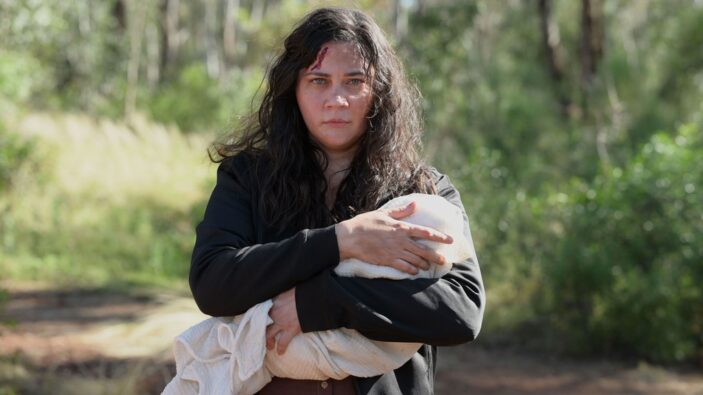
The controversial historical treatment of Australia’s native people by white settlers and the continuing generational trauma within the Indigenous communities weigh heavy on the narrative themes of Jon Bell‘s The Moogai. There’s a ripe premise to lean into horror genre sensibilities – “moogai” is the Bundjalung language for a malevolent child-stealing entity that is the stuff of lore – and, at times, the film delivers on tension and unsettling set-pieces, but its psychological thematic never feels as strongly realised as it could to truly land the impact intended.
Hinging on the same type of maternal terror that plagued The Babadook (no coincidence with the films sharing producers Kristina Ceyton and Samantha Jennings, who were also behind last year’s Sundance success Talk To Me), The Moogai lines in on the psychological struggle that comes with bringing home a newborn, something that plagues Sarah (Shari Sebbens) following the birth of her son, Jacob.
Having suffered a near-fatal heart attack during the birth, the high-flying lawyer has already been pushed to the brink in a physical capacity, so when she starts hallucinating, unintentionally misplacing her new son – something she blames on her young daughter (Jahdeana Mary) – and seeing visions of long-haired girls in dark hallways (an always effective horror staple), she’s unsure if it’s a side effect of the after-birth or something more sinister.
That something sinister could be attached to her place of birth, and her biological mother, Ruth (Tessa Rose), who she has only recently connected with, seems to truly understand Sarah’s altered state of mind. That a demon could be after her children seems ridiculous, and Ruth inserting her own traditional practices in the walls of Sarah’s luxe, modern apartment brings about the vast difference in their individual existences. Ruth won’t be swayed, but Sarah’s almost-violent rejection of Ruth’s ways is understandable given she was given away as a child; the opening sequence clues us in though that such a choice wasn’t made by any easy measures by Ruth.
With such relevant parallels coursing through the film’s narrative of the moogai stealing children against white authorities forcibly taking what didn’t belong to them, it’s a shame that Bell’s script doesn’t resonate stronger. The film seemingly wants to favour its horror temperament, and whilst it flirts with such, it never elevates beyond expectation. Elsewhere, characters are introduced and dropped without notice (Bella Heathcote‘s supposed best friend being the main culprit here), whilst others never react as believably as expected within the story’s context, resulting in the film occasionally coming off as if it’s a parody of the genre.
Whilst The Moogai doesn’t always successfully execute its balance between the physical and emotional, the imagery of the moogai itself can’t be denied as a disquieting creation. As embodied with the sinister athleticism of Paul Chambers, the dual-faced monster dominates the film’s finale, though that too, as a whole, lacks a certain cohesion.
The Moogai is telling a story worth being heard, and there are elements peppered throughout that speak to its significance, but the importance of its message and the shaky execution of its horror mentality don’t gel in a manner that creates an organic experience.
![]()
![]()
![]()
![]()
![]()
TWO AND A HALF STARS (OUT OF FIVE)
The Moogai is playing as part of this year’s Sundance Film Festival, taking place in-person (and select virtually) between January 18th and 28th, 2024, For more information head to the official Sundance page.
